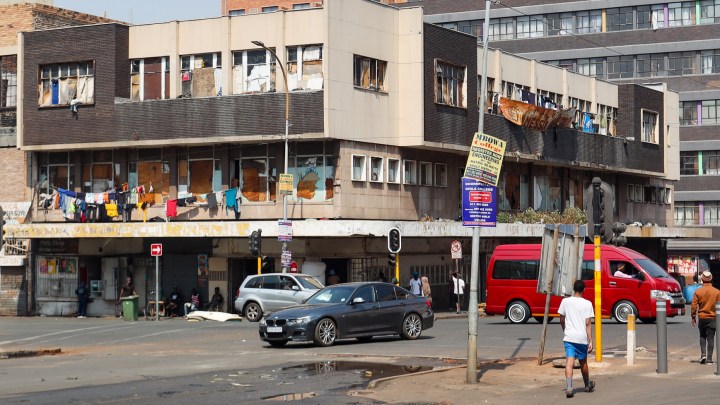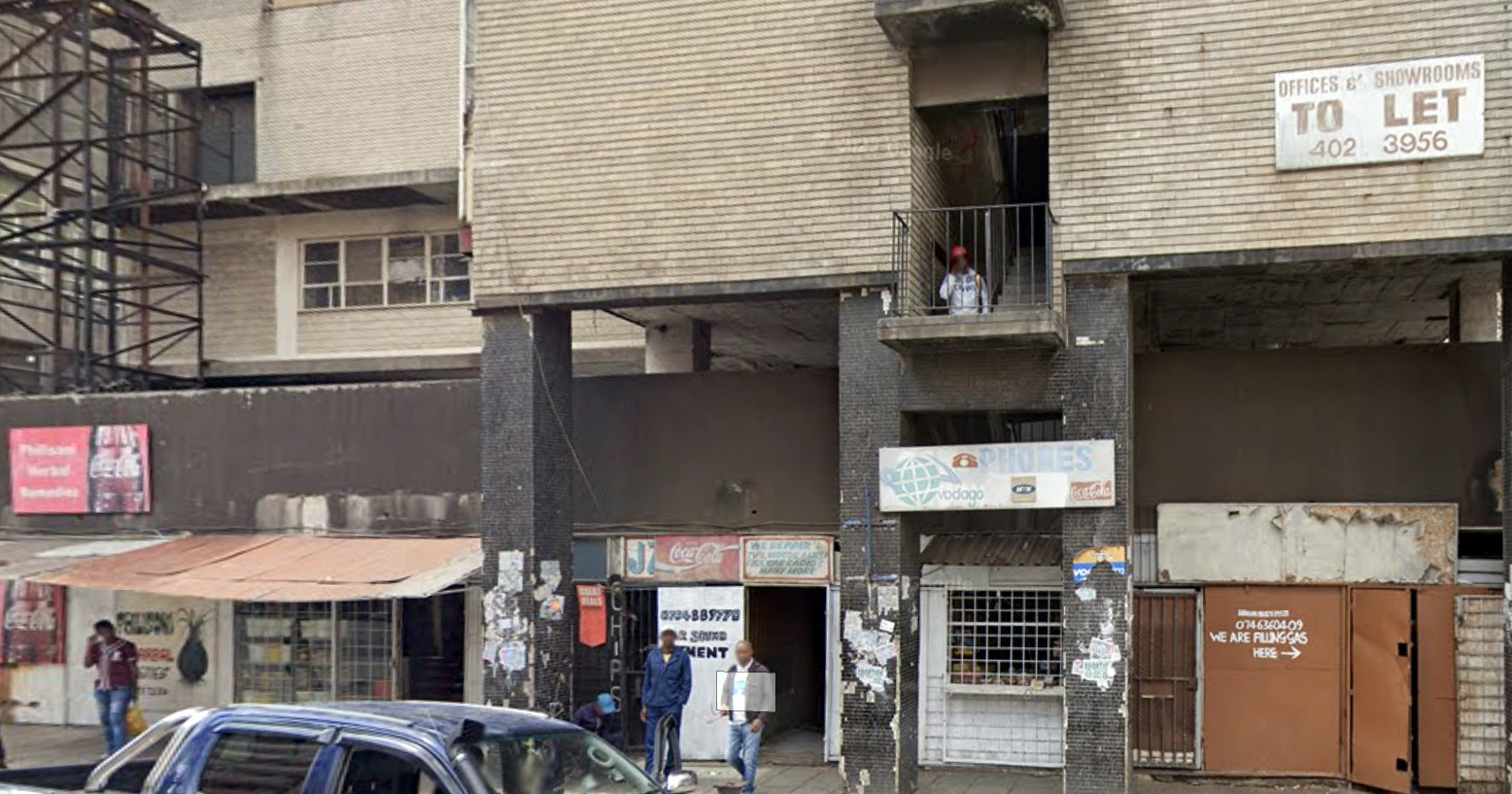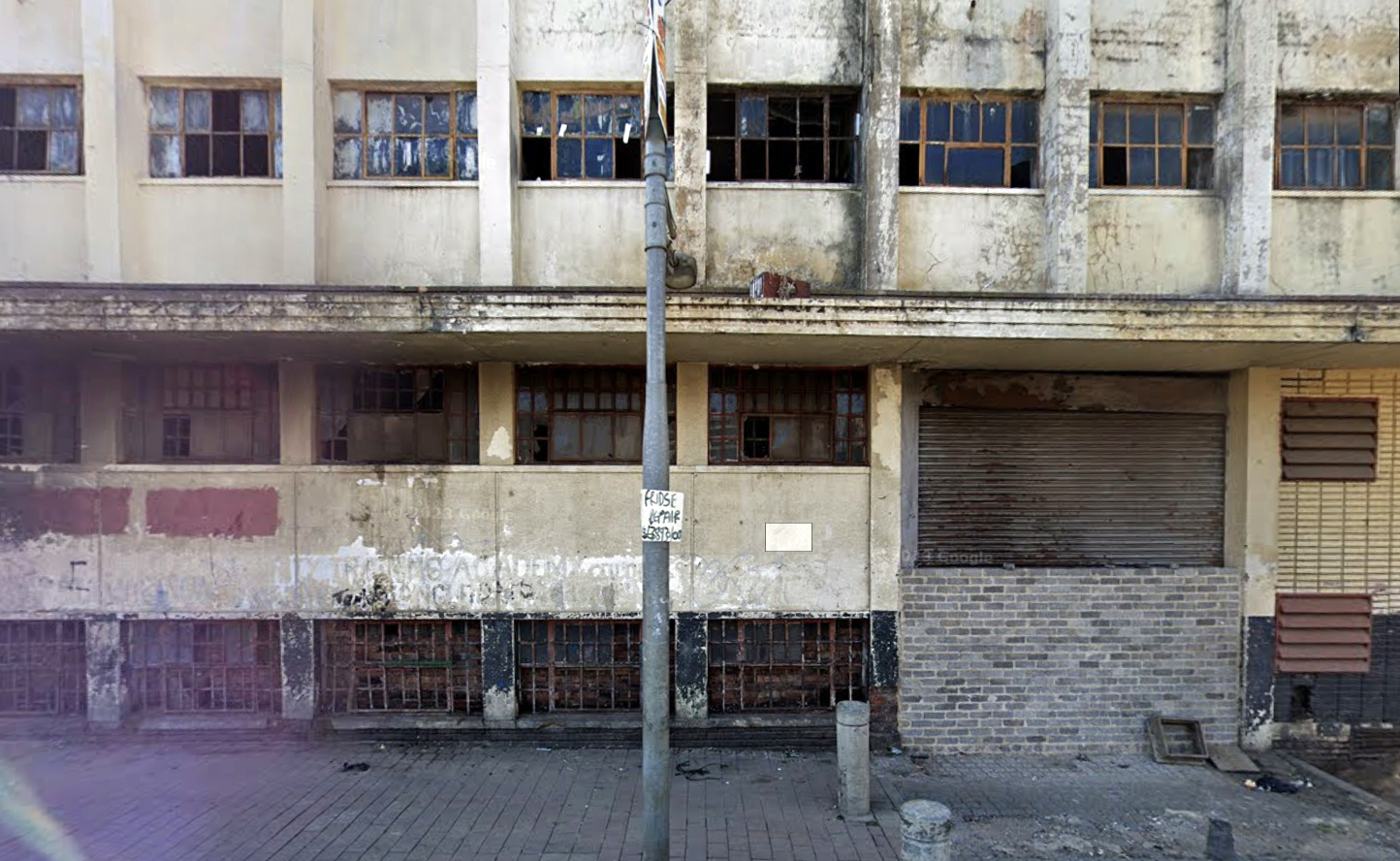INNER-CITY FIRE ANALYSIS
City of Johannesburg pays lip service to tackling ‘hijacked’ buildings

For years, the City of Johannesburg and Gauteng government have talked about addressing the dire state of the inner city’s most derelict buildings. The 80 Albert Street fire has led to more commitments, but no tangible plans.
Over the years, leaders from both the City of Johannesburg and Gauteng have made vocal commitments to addressing the long-standing problem of “hijacked” and occupied buildings in the inner city.
The most recent move comes from Premier Panyaza Lesufi, who on Wednesday, 13 September, announced the terms of reference for a commission of inquiry that will investigate the cause of the recent 80 Albert Street fire and the prevalence of hijacked buildings in Johannesburg’s inner city.
However, many of these commitments have not translated into tangible results on the ground. Despite various efforts, including “sting operations”, raids, inspections and official visits, many of these buildings continue to languish in a state of disrepair.

“Remington House: A Troubled Beacon of Crime in Johannesburg” repeatedly identified as a problem building by the City.(Photo: Google maps)
A grim example is Remington House, bordered by Lilian Ngoyi Street (formerly Bree Street) to the north, End Street to the east, Jeppe Street to the south, and Nugget Street to the west, which has been reported as a notorious hub for criminal activities, including drug trafficking, gang rape, illegal liquor sales and possession of unlicensed firearms.
Between 2016 and 2017, multiple gang rapes were reported to have occurred within its walls, with one particularly horrifying incident involving the alleged kidnapping and gang rape of a 22-year-old woman by 11 Tanzanian men.
The victim and her male co-worker were reported to have been confronted by the suspects while returning from work, with the latter being assaulted and threatened with a firearm. The suspects then forcibly took the woman into the dark recesses of the building, where they subjected her to a nightmarish ordeal of repeated sexual assault. To compound her misery, they also robbed her of her cellphone and money.
This shocking incident prompted the City of Johannesburg to launch raids on similar dilapidated properties in the inner city, in line with its commitment to convert them into rental housing, under the leadership of former mayor Herman Mashaba.
For years, Remington House has had no legal electricity connections, no running water or any other services. Its passages are pitch black and a strong stench permeates the whole building. From the outside, the building is so dilapidated that some parts of it look like they are about to collapse.
Unfortunately, years later Remington House remains one of many slum buildings that are subjected to what the Constitutional Court in 2021 identified as “humiliating and warrantless raids”, as reported in the Mail & Guardian. It is also one of the buildings that have been repeatedly identified as problematic by the city.
Less than five kilometres from Remington House is Msibi House, a privately owned building in New Doornfontein. Previously, it accommodated more than 400 people. Among its occupants were more than 60 people with disabilities, predominantly blind and some in wheelchairs, and more 200 women and children, many of them migrants.

The now closed Msibi House is a privately owned building located in New Doornfontein which previously, accommodated over 400 people, including individuals with disabilities. They were evicted by a group fronting as Operation Dudula in December 2022.(Photo: Google maps)
Like numerous other buildings, Msibi House had become derelict. Its occupants had lived there since 2009 when they were relocated following the xenophobic attacks of 2008. Inside, makeshift boards and curtains divided the cramped living spaces, primarily occupied by Zimbabwean nationals. They relied on illegal electrical connections for power and sourced their water from a JoJo tank, which frequently ran dry.
Read more in Daily Maverick: Inside Joburg’s building of darkness, where migrants live in fear as Operation Dudula threats amplify
Shockingly, there were no functioning toilets within the building; instead, occupants had to pay R2 to use public toilets outside or in nearby garages during the day, and R10 for access to toilets across the street at night.
In December 2022, a group purportedly from Operation Dudula forcibly evicted the building’s inhabitants. It has since remained closed and sealed, with former residents scattered across the city – some homeless, some seeking refuge elsewhere and others returning to their countries of origin.

Nugget Street Express building on the corner of Nugget Street and Commissioner street in the Johannesburg Central Business District (CBD) on 11 September 2023. It is reported that the City of Johannesburg’s Group Forensics and Investigation Services has 188 active cases involving “hijacked” buildings. (Photo by Gallo Images /Fani Mahuntsi)
Renewed focus
The tragic fire that engulfed the allegedly hijacked Usindiso building at 80 Albert Street, claiming the lives of 77 individuals, has catalysed both the local and provincial governments into action to reclaim the so-called “hijacked buildings”.
This crisis is a byproduct of migration to South Africa’s economic capital – leading to overpopulation of the inner city, which began over two decades ago – and government neglect. It has resulted in the proliferation of hijacked or abandoned structures throughout the city, where thousands of vulnerable South Africans and immigrants have sought refuge.
Daily Maverick asked the city the following questions:
- What is the city’s current strategy to resolve the issue of hijacked buildings within its jurisdiction?
- Could you provide an update on the city’s plans to pursue legal action to clarify the requirement to offer alternative accommodation to evictees, which has been cited as a hindrance to dealing with hijacked buildings?
- Can you furnish us with the total number of hijacked buildings in the city and provide a comprehensive list of these structures?
- In light of the recurrent raids, sting operations and official visits to these buildings following the Marshalltown fire and events in recent years, could you clarify the purpose and legality of these operations? Given that the Constitutional Court ruled them as unconstitutional and warrantless in 2021, how does the city justify their continuation?
City of Joburg spokesperson Nthatisi Modingoane answered:
“Property hijacking has long been a challenge in the City of Johannesburg, prompting various interventions over the years. While some efforts yielded limited results, the city recognises the need for a multi-disciplinary approach, involving professionals from different government spheres, to effectively address this issue.
“Key initiatives include the introduction of the Problem Properties By-law (PPB) in 2015, the launch of the Inner-City Roadmap and the establishment of the Inner-City Programme Office. In 2017, the Group Forensic and Investigation Services (GFIS) department created the Property Hijacking and Compliance Investigation Unit.
“Since the establishment of GFIS in 2017, the department received 2,055 cases of hijacked properties for both city-owned and privately owned properties. A total of 126 cases are city-owned properties and to date, 116 cases have been resolved,” continued Modingoane.
Daily Maverick has reported that the current city administration has all but closed the GFIS’s unit tackling problematic properties while it continues to target the GFIS, the city’s anti-corruption body.
Modingoane continued: “When property hijacking allegations are substantiated, the matter is referred to the South African Police Service (SAPS) for criminal cases, followed by a process involving the National Prosecuting Authority (NPA).
“Property owners are required to enter into compliance agreements with the city to ensure adherence to relevant legislations and by-laws. If owners are untraceable, the city pursues legal processes for property acquisition, with the Department of Human Settlements handling maintenance and renovations for city-owned properties used for housing purposes.”
Modingoane added that challenges facing the city include legal frameworks and judgments against the city, as well as obligations to provide temporary emergency accommodation (TEA) to evicted unlawful occupiers, hindering progress.
“The city is currently meeting with various stakeholders from the city, provincial and national government to try and find ways of dealing with the scourge of hijacked properties. It is essential that we bring back the rule of law in our city and take hijacked properties back from the criminal elements such as landlords who take advantage of desperate people and house them under deplorable conditions.”
However, this is a reiteration of the same old points, with no new policies to deal with the problem. Maybe, if the city and provincial government had followed through on their lofty plans, repeated over the years, 77 people might not have died on 80 Albert Street. DM


















Comments - Please login in order to comment.